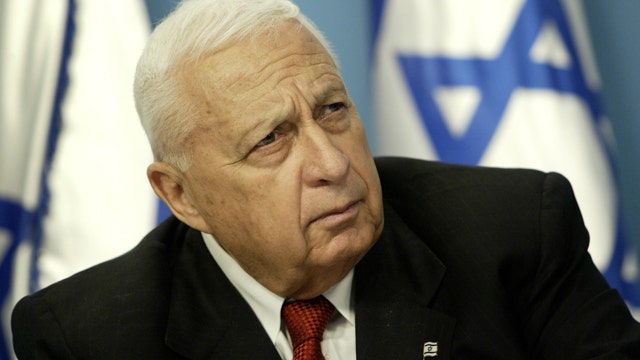Ariel Sharon dead at 85
One of Israel's most iconic and controversial figures had been in a coma since he suffered a stroke in 2006
Former Israeli prime minister and storied general Ariel Sharon, who was at the height of his power when he suffered a stroke in 2006 and fell into an irreversible coma, died Saturday at the age of 85.
Sharon died at Tel Hashomer hospital just outside Tel Aviv, where his family had gathered at his bedside over the past several days as his vital organs reportedly deteriorated. His death was first reported by Israeli Army radio.
Visiting U.S. Secretary of State John Kerry addressed Sharon’s condition ahead of a meeting with Prime Minister Benjamin Netanyahu Thursday.
"My thoughts are with the Sharon family as they sit in vigil with the former prime minister of Israel, Arik Sharon," Kerry said, referring to Sharon by his nickname. "We remember his contributions, sacrifices he made to ensure the survival and the well-being of Israel, and I have many personal thoughts about my meetings with him on many different occasions -- always robust and strong and clear about his positions."
Sharon, an iconic figure who fought in three wars before entering politics, was elected prime minister in 2001. He suffered a stroke in January 2006, at the height of his political power, and remained comatose since then.
However, in 2011 his son Gilad told the New York Times his father could move his fingers when he asked him to, adding, "I am sure he hears me."
In the months leading up to his stroke, longtime hardliner Sharon had shocked his political base by expelling Jewish settlers from 21 Gaza settlements and from four on the West Bank
He also resigned as head of the Likud party and formed a new centrist party called Kadima ("Forward").
Sharon's longtime rival and current prime minister, Netanyahu, was elected his replacement as head of Likud.
Sharon suffered a mild stroke in December 2005 and was released from the hospital after two days. A little more than two weeks later he suffered a massive intra cerebral hemorrhage from which he never recovered.
Sharon's deputy, Ehud Olmert, was elected prime minister two months later.
Sharon was born February 26, 1928 in the then British Mandate of Palestine to a family of Lithuanian Jews. By the age of 10 he had entered the Zionist youth movement Hassadeh and later the Haganah, the military precursor to the Israel Defense Forces.
His military career flourished as he became a commander in the Israeli army, celebrated as a military strategist.
He was an instrumental figure in the 1956 Suez War, the Six Day War of 1967, the Yom Kippur War of 1973 and as Minister of Defense directed the 1982 Lebanon War.
Sharon joined the Likud party after retiring from the military, serving in a number of ministerial posts and then as party leader in 2000 before becoming prime minister from 2001-2006.
Widowed twice, he is survived by his sons Gilad and Omri.
The Associated Press contributed to this report

